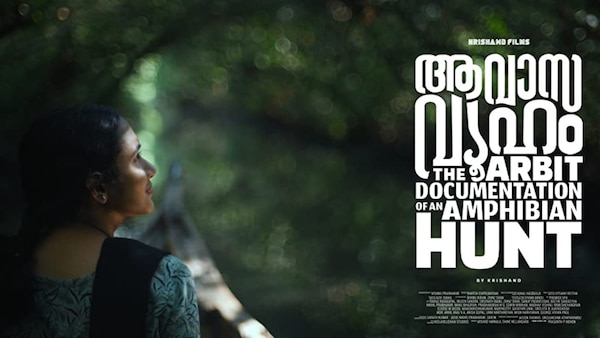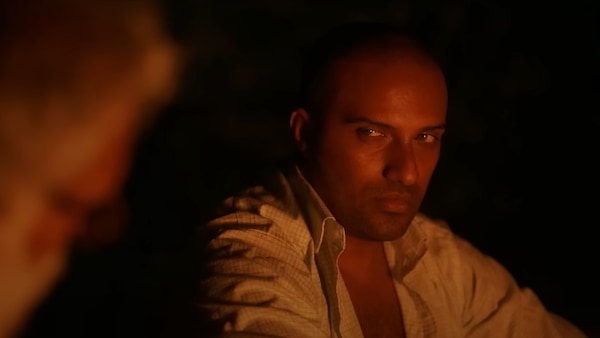Aavasavyuham review: A riveting social commentary through the lens of a sci-fi drama
The film is an unlikely blend of a socio-political drama set in Kerala and science fiction that offers something truly unique from a film industry that is yet to create a dent in the sci-fi genre

Last Updated: 06.16 PM, Aug 04, 2022
Story: The plot revolves around a mysterious man named Joy (Rahul Rajagopal) who appears to have a special gift that grants him the ability to attract marine and aquatic life, which helps local fishermen, or the people he is working for. His empathy towards those who have been kind to him often lands him in mortal danger. He is forced to find refuge on a couple of occasions when things go awry, but as those around him finally begin to gain a sense of understanding about him, his past, his abilities, and his very existence becomes shrouded in more mysteries.
Review: The Malayalam industry has carved a niche audience for itself in recent years producing some stellar titles. But despite a few groundbreaking films with compelling stories, there has been an evident dearth of pluralistic content spread across multiple genres. The ‘Malayalam drama film’ is a category that is being overwhelmed with theatrical and direct-to-streaming releases. So Aavasavyuham or The Arbit Documentation of An Amphibian Hunt: Aavasavyuham is most definitely a change of pace that breathes new life into an industry that desperately needed an injection of fresh ideas for more genres. While it is never a foregone conclusion that having different films translates to ‘quality content’, Aavasavyuham has delivered a remarkable story with stunning visuals, an engaging screenplay, and a compelling narrative structured in a non-linear format.

The opening few minutes of the film keeps the audience in the dark about the core elements of the story. If one were to watch the film completely unaware of its basic premise they would mistake it for a nature documentary. There is a significant emphasis on a style not too dissimilar from the acclaimed comedy series The Office, like a mockumentary where characters speak in front of the camera to provide exposition. But as soon as the film begins the first of its three chapters the audience is finally given a taste of what the film is really about, and it does not disappoint.
Joy is showcased as a gentle giant, one with nature and fiercely loyal to the very few who are close to him. The first chapter tells the story of how he falls in love with a woman named Lizzy (Nileen Sandra) and how their secret romance became the envy of a local businessman/gangster who had hoped to convince Lizzy to marry him. But after his advances are rebuffed by Lizzy he decides to ‘teach Joy a lesson’ about why a ‘civilised society’ does not condone such relationships. But as one would imagine chaos ensues, and more light is shed on the mysteries surrounding Joy.

The second chapter sees Joy working for a local fisherman (Zhins Shan), and how Joy uses his unique abilities to help this fisherman grow his business. Joy yet again stumbles upon another conflict, but this time with the local law enforcement. The chapter further explores Joy’s mental makeup as the narrative inches a little closer to understanding the man. By the time the third chapter involving Geethi Sangeetha’s character commences, it becomes evident that Joy is no ordinary human being, or if he is even human at all but a metamorphic human/amphibian instead. The story then finally positions itself as a sci-fi drama fleshing out the various complexities surrounding the very nature of Joy's existence.

The film’s structure, with documentary-style interviews and clips of TV debates surrounding the myths about Joy, is almost reminiscent of how Zack Snyder used this particular plot device in his DC films to ask the question, “what if Superman was real? And how would the world react to it?”. Ultimately, the film is a social commentary on several contemporary issues in society and Kerala as a whole. The first chapter puts toxic masculinity under the microscope, the second chapter is a criticism of the much-publicised police brutality in recent years in the state, whereas the third chapter focuses on society’s obsession and fear of the unknown. There are also satirical takes on religious dogmas that appear to have a death grip on people’s perceptions. In fact, the ongoing socio-political turmoil in the film is a reflection of real-life issues in Puthuvype, Cochin where rapid industrialisation is deteriorating the ecological balance of the area.

The film is by no means a truly unique concept, it has taken liberties and influences from several literary works and screen adaptations. But to the credit of director Krishand and writer Renoy Scaria Jose, the film is not an imitation but rather a pastiche of titles such as The Office TV series (2005), David Cronenberg’s 1986 film The Fly, Franz Kafka’s novel The Metamorphosis, and Guillermo del Toro’s Academy winning 2017 film The Shape of Water. In hindsight, the surreal character of Joy is likely an allegorical reference relating to themes of existentialism.
Verdict: Aavasavyuham may not be a conventional story from the Malayalam industry, but therein lies its greatest strength. Despite taking a few inspirations from a few notable sources it offers a distinct style and stands on its own as a thought-provoking film that has found just the right balance between an art house production and a fast-paced vibrant science fiction.
Subscribe to our newsletter for top content, delivered fast.

